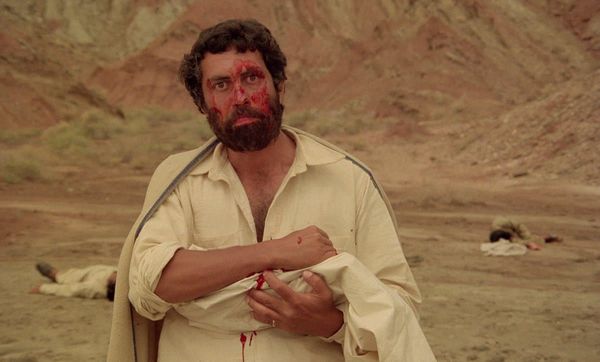Eye For Film >> Movies >> The Blood Of Hussain (1980) DVD Review
The Blood Of Hussain
Reviewed by: Sunil Chauhan
Read Sunil Chauhan's film review of The Blood Of Hussain
A glorious restoration released in a dual-format edition, newcomers will find cause to wonder why the film hadn’t been given this treatment earlier. If The Blood Of Hussain offers peak evidence of Dehavli’s talent, this package makes a case for wider recognition of his place as a leading figure of Pakistani cinema.
Towers Of Silence, a stark, black and white, 51-minute film from 1975 is teeming with memorable motifs, at times resembling an austere search for the most perfectly composed image. An exploration of a young boy trying to navigate living inside Islam and Zoroastrianism that boasts striking scenes of death rituals, ants in toilet bowls and vultures descending on carcasses with a disorienting sense of time collapsing on itself, it’s a film that rewards repeat viewings and demands analysis.

It’s provided amply in Between The Sacred And The Profane, an enthusiastically scholarly lecture by Dr Ali Nobil Ahmad delivered during a recent retrospective of Dehlavi’s work at the BFI, with the subject himself sitting in the audience. Like an academic fanboy, Ahmad joins Dehlavi’s films to everything from Georges Bataille to Marxism and the Iranian revolution, focusing mainly on the two films present here. If you were looking for new ways to look at The Blood Of Hussain and Towers Of Silence, Ahmad offers several routes to open them up.
Jamil Dehlavi In Conversation, an hour-long talk between Timothy Cooper and the man himself, now a well-preserved 73 years old, shows the director less interested in revealing personal details (Dehlavi comments that Towers Of Silence was partly about his “demons”, though shrewdly stops there) but does reveal some fascinating historical background. The Blood Of Hussain might not be any closer to getting an official Pakistani release, but Dehlavi hasn’t always been a victim of state censorship. Towers Of Silence was screened privately for Zulfikar Ali Bhutto, the country’s prime minister in the mid-Seventies, while his biopic of Muhammad Ali Jinnah was partially funded by the Pakistani government until casting controversies set in. Excerpts from the later Born Of Fire, made during a period when Dehavli was getting regular funding from the BFI, the BBC and Film Four, show a director happy to scare western audiences with foreignness, while an awe-inspiring clip of glowing molten lava set to Tangerine Dream from Qâf - The Sacred Mountain is tantalising.
Reviewed on: 30 Oct 2018
















